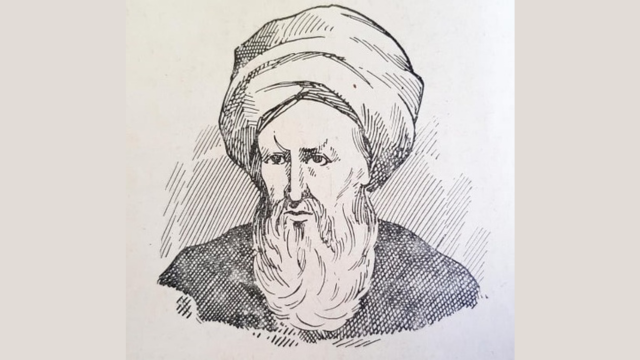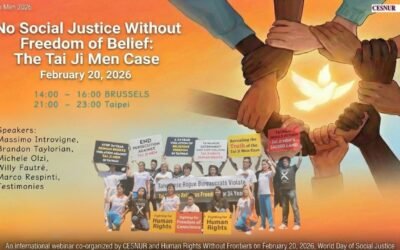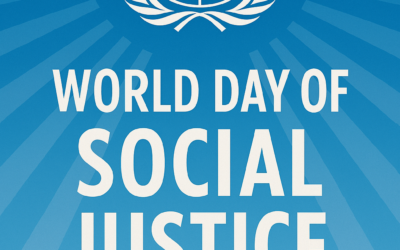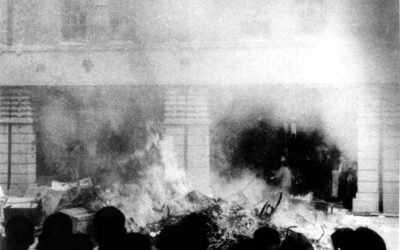As Ibn Khaldun reminds us, injustice ruins civilization — but by restoring justice, we open the path to genuine peace for all.
by Davide S. Amore*
*A paper presented at the webinar “No Peace Without Justice for Tai Ji Men,” co-organized by CESNUR and Human Rights Without Frontiers on September 21, 2025, United Nations International Day of Peace.

I will share some reflections on the theme “No Peace Without Justice,” through the lens of the great Muslim historian and philosopher Ibn Khaldun, and in dialogue with the contemporary case of the Tai Ji Men spiritual movement.
Ibn Khaldun, writing in the 14th century, famously argued that injustice is the surest path to the destruction of civilization. In his view, peace was not merely the absence of war but the presence of justice. This insight speaks powerfully to our time, especially when considering prolonged injustices such as those suffered by the Tai Ji Men community.
In his “Muqaddimah,” Ibn Khaldun laid down one of the most influential analyses of history and society. At its heart is the idea of “ʿasabiyya”—social cohesion, the solidarity that enables communities to flourish. Yet he also insisted that this cohesion depends on justice. He warned rulers against corruption, arbitrary taxation, and the abuse of authority, for these acts undermine legitimacy and fracture the social bond.
He wrote, and I quote in summary: when rulers impose unjust taxes, confiscate property without right, or fabricate accusations, they erode trust. Once the people lose confidence in justice, the state’s foundations crumble. Injustice, Ibn Khaldun declared, is not only morally wrong—it is a sociological poison.
Thus, for him, peace was inseparable from justice. A community cannot live in harmony if its members are subjected to false accusations, economic exploitation, or denial of their rights. This theoretical framework is strikingly relevant to the case we are discussing today.

The Tai Ji Men case is one of the most persistent examples of injustice in recent decades. Let me briefly recall its main stages for those who may not be familiar with it.
In 1996, after Taiwan’s presidential elections, Tai Ji Men and its leader, Dr. Hong Tao-Tze, became targets of fabricated tax evasion and fraud accusations. The charges were politically motivated and entirely baseless. After years of legal proceedings, the criminal courts, including Taiwan’s Supreme Court, cleared Tai Ji Men of all accusations. They affirmed that there was no tax evasion, fraud, or violation of law.
Yet, despite this clear judicial ruling, the National Taxation Bureau persisted in issuing tax bills against Tai Ji Men for multiple years, relying on the original false accusations. This persistence of injustice is precisely what Ibn Khaldun described: the corruption of power, when a state or its agents refuse to respect justice even after the truth has been established.
The injustice did not stop at paperwork. In 2020, after years of struggle, government agencies unlawfully seized and auctioned Tai Ji Men’s land intended for spiritual and educational purposes. This was not only a violation of property rights; it was an assault on the dignity and freedom of a spiritual community.
In Ibn Khaldun’s terms, what is most striking is the long-term damage such injustice inflicts: the erosion of trust in institutions, the sense that the rule of law is being hollowed out, and the perception that truth and fairness can be sacrificed for political or bureaucratic expediency.
Here, Ibn Khaldun’s insights help us see why the Tai Ji Men case matters far beyond Taiwan’s borders. When injustice becomes systemic—when fabricated accusations are maintained despite judicial acquittal, when wrongful taxation becomes a weapon against a peaceful spiritual community—society is harmed.

Ibn Khaldun warned that injustice leads to decline because it breaks the moral contract between the rulers and the ruled. Citizens or communities that see their rights trampled lose confidence in government, solidarity fractures, and the legitimacy of authority collapses.
This is not merely a tax dispute applied to Tai Ji Men. It concerns whether justice— the foundation of peace—can prevail over entrenched bureaucratic wrongdoing. It concerns whether a society values truth and fairness enough to repair the wrongs inflicted upon innocent people.
Thus, the lesson is clear: peace cannot be proclaimed while injustice persists. Ignoring such injustices will court social unrest, spiritual alienation, and the corrosion of civil trust. Restoring justice, however, will rebuild peace—both within the affected community and within the larger society.
In closing, allow me to return to Ibn Khaldun’s timeless principle: Injustice ruins civilization. This is not just a medieval reflection. It is a living truth that speaks directly to the challenges of our own time.
The Tai Ji Men case exemplifies the danger of ignoring this truth. Even after the courts have spoken, if injustice persists, then peace remains hollow. But if justice is finally restored, reconciliation, harmony, and social trust can be renewed.
“No peace without justice” is not a slogan. It is a law of history, as Ibn Khaldun taught us. And it is a call to action today: to stand with the victims of injustice, to insist on truth, and to recognize that peace only blossoms where justice has taken root.




